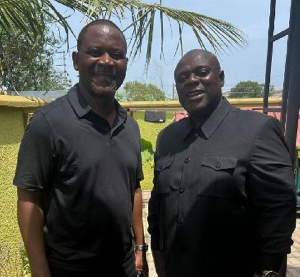- Home - News
- TWI News | TV
- Polls
- Year In Review
- News Archive
- Crime & Punishment
- Politics
- Regional
- Editorial
- Health
- Ghanaians Abroad
- Tabloid
- Africa
- Religion
- Election 2020
- Coronavirus
- News Videos | TV
- Photo Archives
- News Headlines
- Press Release
General News of Sunday, 19 November 2006
Source: GNA
33,000 Civil Servants to be redeployed
Sogakope (V/R), Nov. 19, GNA - Over 33,000 civil servants out of the about 42,000 currently working under the Civil Service are to be redeployed to the Local Government Service (LGS) beginning January 1, 2007 to accelerate and consolidate the process of decentralization.
"We have the political will and commitment from the highest authority, whilst national bureaucrats have been sensitised to cede power and control to the assemblies and the assemblies psyche up to build the capacity to absorb the decentralized management," Mr Joe D. Issachar, Head of Civil Service stated at Sogakope on Saturday.
Mr. Issachar was addressing Chief Directors of Ministries, Regional Coordinating Councils Directors, Members of Parliament and Senior Civil Servants at a three-day capacity workshop on; "Integration of Line Departments Into the Fold of Metropolitan, Municipal and District Assemblies (MMDAs)."The LGS Act 2003, (Act 656) establishes a single unified Local Government Service for all the local authorities in Ghana. He explained that Section 34, stipulates, "on the coming into force of the Act the members of staff of the 14 civil service departments listed in the schedule shall be deemed to have been transferred to a Department of a District ... to form part of the service from the date of transfer."
The workshop was organized by the Local Government Service Council in collaboration with the Ministry of Local Government, Rural Development and Environment and UNDP.
It was to discuss the integral part of the communication strategy of the service to build bridges to stakeholders at all levels, foster consultation, collaboration and coordination with other stakeholders to push the implementation of the programme of decentralization forward.
The personnel have been classified under 11 decentralized departments, Central administration, Finance, Education Youth and Sports, Health, Agriculture, Physical Planning, Social Welfare and Community Development, Natural Resources Conservation, Works, Trade and Industry, and Disaster Prevention.
Mr Issachar explained that functions previously performed by branches, divisions or units of the departments to be transferred have been identified and merged with those of the assemblies. On staff ranking at the decentralized departments at the assemblies, the Head of the Civil Service said they would be identified by age, rank, qualification and skills before transferred to form part of the Local Government Service. Mr. Issachar noted that all Chief Directors, including the regional coordinating Directors are to communicate the envisaged changes to their respective regional and district officers, especially the new performance appraisal system, control and reporting mechanism to guide staff assessment and development for efficient performance. In an interview with the Ghana News Agency, Nana Rex Owusu-Ansah Acting Head of the Local Government Service explained that the process was to integrate the decentralization process, which involves the devolution of central administrative authority to sub-national governments. He noted that the integration process had gone through major re-organisation of departments at the district level - identifying the presence of line departments, defining and clarifying their functions, structure, job description of head of departments, and scheme and condition of service for personnel of the departments. The decentralization of 22 functional areas of government to the sub-national governments, fussion of government agencies at the sub-national level and local governments units into one administrative unit "Single Hierarchy Model," through the process of institutional integration, manpower absorption, composite budgeting and provision of funds for the decentralized services. Nana Owusu-Ansah said the promotion of popular grass-root participation in the administration of the various areas concerned from the stand points of planning, implementation, monitoring and achievement of those services, which go to improve the living conditions of the people and the orderly, fair and balanced development of the whole country. The Acting Head of the Local Government Service, who is also the Board Chairman of the Ghana News Agency said under the comprehensive local government and administrative reforms, "the Central Government Ministries, Departments and Agencies are to undertake policy planning, monitoring and evaluation of development policies and programmes. "Regions, through the Regional Coordinating Councils and respective Regional Planning and Coordinating Units, now play an important role of coordination, not in regular manner, but ensure consistency, compatibility and coherence of district level development, facilitate joint ventures among districts and monitor the activities of District Assemblies within the regions. The District Assembly is primarily responsible for the implementation of development policies and programmes coordinated by the National Development Planning Commission. In a speech read on his behalf, Dr. Paa Kwesi Nduom, Minister of Public Sector Reform said as a first step for implementation of the reforms, government had introduced and passed new legislation, which gave legal backing to the movement of some parts of government machinery from the centre to the districts and municipalities. "The first Ghana Poverty Reduction Strategy (GPRS I) defined a programme of decentralization that even promised to remove the barriers that prevented the election of District Chief Executives," he told the participants. Dr Nduom said the Government is committed to ensure the movement of civil servants from the office of Civil Service to the Local Government Service by first January, 2007. "We will work with the Ministry of Local Government, Rural Development and Environment, the Ministry of Finance and Economic Planning and Development Partners to ensure that there is a common resources pool, with a single reform agenda aimed at accelerating the pace of decentralization. "Support Local Government to use legislation to make clearer Government's commitment to decentralization and use the Public Sector Reform Work Programme to promote decentralization in visible and concrete terms," he said.
Chief Directors pledge to support redeployment
Sogakope (V/R), Nov. 19, GNA - Chief Directors and Regional Coordinating Directors on Saturday pledged their commitment to support the integration of about 33,000 civil servants into the Local Government Service (LGS) by January 2007. A communiqu=E9 signed by 15 Chief Directors and Directors across the country reads: "recognizing the important roles we play in the machinery of Government, particularly in bringing change and development in the body politic, especially for the integration process for the decentralized departments, we accept to sensitise our staffs to accept and embrace the reform. "We do hereby affirm our support for the on-going implementation of Government's decentralization policy," the directors stated at the end of a three-day capacity workshop on; "Integration of Line Departments Into the Fold of Metropolitan, Municipal and District Assemblies (MMDAs)." The workshop was organized by the Local Government Service Council in collaboration with Ministry of Local Government, Rural Development and Environment, National Governance Programme and UNDP to discuss the integral part of the communication strategy of the service to build bridges to stakeholders at all levels, foster consultation, collaboration and coordination with other stakeholders to push the implementation of the programme of decentralization forward. The Chief Directors also endorsed the initiatives of the Ministry of Local Government, Rural Development and Environment, the Local Government Service, Office of the Head of Civil Service and the Ministry of Public Sector Reform towards implementing the integration by January 2007. They further endorsed the treasury re-alignment of the Controller and Accountant-General's Department as the first step towards the subsequent integration of the budgets and funds of decentralized departments into the district assembly financial management system. The Communiqu=E9 also recognized that once staff and functions have been transferred to the district authorities, funds should be released regularly based on composite planning and budgeting to the assemblies to enable it perform their functions effectively. The Chief Directors proposed that short, medium and long-term recruitment and training programmes be organized to fill the staff gaps of the Local Government Service. They pledged not to impede the process, individually or collectively and assured the nation that they would work religiously to meet the January 2007 deadline for the implementation of the integration process. The Communiqu=E9 was jointly signed by Mr S. A. Manu, Eastern Regional Coordinating Council (RCC); Mr F. O. Boateng, Brong Ahafo RCC; Mr J. Owusu Senyah of the Ministry of Transportation; Mr David Yaro, from Western RCC; DR. E. N. Barnor, Ministry of Foreign Affairs; Mr E. A. Akuffo of the Ministry of Manpower Youth and Employment; Ms A. Ruby Beachem of the Ministry of Mines, Lands and Forestry. The rest were; Nii Lantey Blankson of the Ministry of Energy; Mr Ababio Okyere-Darko of the MLGRD&E; Mr E. Y. Kwarteng from Ashanti RCC; Mr A. A. Ampong of the Ministry of Information and National Orientation; Mr Ernest Nyagbe from Greater Accra RCC; Mr S. G. A. Nlary from Upper East RCC; and Mr Kwesi Armo-Himbson of Ministry of Trade. Meanwhile Nana Yaw Boachie-Danquah, Chairman of the Local Government Service Council (LGSC) said the new departments were being established to eliminate duplication of functions between agencies at the sub-national level, relieve managers at the centre of routine tasks and simplify complex bureaucratic procedures; transfer competence and ensure rational use of existing limited human resources. It would also enhance close relationship and inter-relationship between the agencies being merged and create synergy, provide environment for the exchange of ideas and skills by personnel who hitherto have been operating within the confines of their separate entities. Nana Boachie-Danquah stressed "the presence of key decentralized departments at the local level would ensure the availability of competent technical, administrative and managerial personnel at the Districts including District Coordinating Directors, Planning Officers, Budget Analysts, Finance Officers and Heads of Decentralized Departments."He assured the Chief Directors that the Council have noticed the non-availability of some departments and personnel at the district level, existence of some laws that centralize some departments in Accra, the enactment of new laws, which had conflicted with decentralization and the lack of orientation and training to make district staff development focused. 19 Nov. 06
Entertainment









